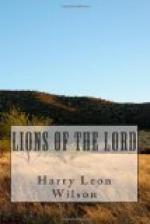When the fervent amens had died away they sang the farewell hymn:—
“Thrones shall totter, Babel fall,
Satan reign no more at all;
“Saints shall gain the victory,
Truth prevail o’er land and
sea;
“Gentile tyrants sink to hell;
Now’s the day of Israel.”
The words of the young Elder were felt to be highly consoling; but a toast given by Brigham that night was longer talked of. It was at a farewell party at the house of Bishop Wright. On the hay-covered floor of the banquet-room, amid the lights of many candles hung from the ceiling and about the walls in their candelabra of hollowed turnips, the great man had been pleased to prophesy blessings profusely upon the assembled guests.
“I am awful proud,” he began, “of the way the Lord has favoured us. I am proud all the time of his Elders, his servants, and his handmaids. And when they do well I am prouder still. I don’t know but I’ll get so proud that I’ll be four or five times prouder than I am now. As I once said to Sidney Rigdon, our boat is an old snag boat and has never been out of Snag-harbour. But it will root up the snags, run them down, split them, and scatter them to the four quarters. Our ship is the old ship of Zion; and nothing that runs foul of her can withstand her shock and fury.”
Then had followed the toast, which was long remembered for its dauntless spirit.
“Here’s wishing that all the mobocrats of the nineteenth century were in the middle of the sea, in a stone canoe, with an iron paddle; that a shark would swallow the canoe, and the shark be thrust into the nethermost part of hell, with the door locked, the key lost, and a blind man looking for it!”
CHAPTER IX.
Into the Wilderness
Onto the West at last to build the house of God in the mountains. On to what Daniel Webster had lately styled “a region of savages and wild beasts, of deserts, of shifting sands and whirlwinds of dust, of cactus and prairie-dogs.”
The little band of pioneers chosen to break a way for the main body of the Saints consisted of a hundred and forty-three men, three women, and two children. They were to travel in seventy-three wagons, drawn by horses and oxen. They knew not where they were to stop, but they were men of eager initiative, fearless and determined; and their consolation was that, while their exodus into the desert meant hardship and grievous suffering, it also promised them freedom from Gentile interference. It was not a fat land into which they were venturing; but at least it was a land without a past, lying clean as it came from the hand of its maker, where they could be free to worship God without fearing the narrow judgment of the frivolous. Instructed in the sacred mysteries revealed to Joseph Smith through the magic light of the Urim and Thummim, and sustained by the divine message engraved on the golden plates he had dug up from the hill of Cumorah, they were now ready to feel their way across the continent and blaze a trail to the new Jerusalem.




